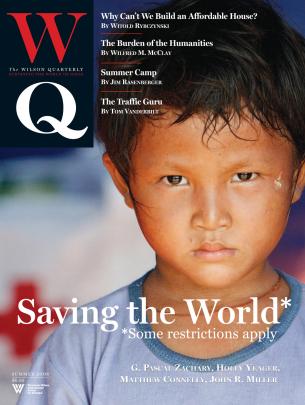Saving the World


The quality of mercy may not be strained, as Portia said in Shakespeare’s Merchant of Venice, but its quantity certainly is—at least if you’re an accused or convicted lawbreaker.
Meet the donor class, a small group of wealthy, highly educated urban and suburban residents with the means and inclination to influence the outcomes of congressional races far afield.
Some little-known tips for reaping Federal pork dollars. Hint: Vote against the president.
Lobbyists take note: Having a female child significantly increases the likelihood that a legislator will cast a liberal vote, particularly on reproductive rights issues.
A foreign policy expert warns that the troop surge in Iraq, while yielding short-term gains, may endanger Iraqis later on.
Four Middle East dictators, backed by the U.S. for the stability they bring, are getting old, and none have a successor with clear popular support.
"The rule of law" is the latest thing in economics. Trouble is, no one is quite sure what it means, or whether it yields positive results.
Chief executive pay went up by more than 500 percent, on average, from 1980 to 2003, but so did the value of the top 1,000 firms.
Highly educated women delay having children longer than those without as much schooling, and face greater wage losses if they don’t.
Multitasking is bad on the road, bad in the office, and, well, just plain bad.
One things been made clear by the housing crisis: not everyone should own their own home. Renting has its merits.
Those looking for the elusive ivory-billed woodpecker would do well to listen to the locals.
A recent book criticizes the school choice movement, and opens up a hornets' nest of angry retorts.
The news media focused on Kim Jong Il's peculiarities while missing the story on North Korea developing nuclear capabilities.
How does today's young generation get their news? Mostly they don't.
The French turned over far more money to the Nazi occupiers in World War II than the armistice called for, so much, in fact, that the Germans could not spend it all.
John Stuart Mill believed the American Civil War to be a necessary evil, worth the terrible cost to eradicate slavery from the society.
Many scholars view Friedrich Nietzsche's exploitation by the Nazis as a travesty based on ignorance and willful distortion, but the truth may be more complicated.
Women have long been warned that their own unheathful practices can be devastating for children they bear, but new research is showing that fathers contribute their own medical legacies.
What's wrong with using drugs to improve the brain's performance?
Maybe life really is one in a hundred billion. If so, that might be good news for Earth.
William Faulkner, a reclusive writer fond of drink, might seem a curious emissary to foster American goodwill abroad. But in those Cold War times, artists and intellectuals were considered not only relevant but vital to U.S. foreign policy.
If embassy size relates proportionately to international prestige, what are we to make of two mammoth new entries--the Chinese embassy in Washington, and the new U.S. embassy in Baghdad?
Spain's calls for justice against Augusto Pinochet raised a clamor for the country to come clean about atrocities during the Franco years.
Kazakhstan officials are frustrated by their most famous "citizen": Borat, the comic buffoon created by comedian Sacha Baron Cohen, who has brought unasked-for attention to the former Soviet satellite but boosted tourism.
Michael Anderson on Marcus Garvey, "the most confounding figure in the history of black America."
D. T. Max on a study of insomnia, written by one of its sufferers.
Lynn Berry on Boris Yeltsin, the complicated figure who "gave Russians a personal independence that they will not easily relinquish."
Karl E. Scheibe looks at the social meaning behind the Nazi salute.
Matthew Dallek on the Nixon era.
Edith Gelles looks at the muse of the American Revolution, Mercy Otis Warren.
Martin Walker considers the forces that shape history.
A. J. Loftin on Wallace Stegner, whose fiction is "as wide open as a western sky."
Andrew Starner on Allan Kaprow, "the most known unknown artist of the 20th century."
Nicholas Carr on American business schools.
Stephen Bates examines the hard realities of modern-day journalism.
Jeffrey Burton Russell looks at original sin.
Mary Swander on pantheism and the epiphany of Sharman Apt Russell.
Eric Hand on the history of Niagara Falls.
Bonnie J. Rough on the rapidly changing world of the gene.
What use are the humanities? Even some scholars no longer seem sure. But at a time when bioengineering throws into question what it means to be human, the answer should be obvious.
The abolition of slavery was the great cause of 19th-century humanitarians. In the 21st century, argues a former U.S. ambassador at large on modern day slavery, it needs new champions.
An unassuming Dutch traffic engineer showed that streets without signs can be safer than roads cluttered with arrows, painted lines, and lights. Are we ready to believe him?
One explanation of America’s housing market collapse is that too many people bought too much house. The solution: build more affordable houses. Here’s what stands in the way.
The rapid expansion of relief efforts since the end of the Cold War has produced a surprising result: a series of difficult moral questions about the humanitarian enterprise.
A new humanitarianism is emerging as private donors and governments respond to the world’s needs.
It seemed an obvious answer to the ills of the developing world. So how did the population control movement go so terribly wrong?
Why do we send children weaned on video games into the woods with knives and kindling? A perplexed father considers the beloved American tradition that is summer camp.